- Home
- James A. Michener
Chesapeake Page 10
Chesapeake Read online
Page 10
As long as King Henry lived, Sir Devon experienced no religious pangs. Both he and the king remained devout Catholics, and when the latter ordered two heretical Lutherans burned at the stake, Sir Devon applauded. “We want no schismatics here,” he told his son Latimer.
He died three months after his king, thus escaping the chaos into which England fell when the boy, Edward VI, reigned briefly. Sir Latimer Steed, who inherited the title and the considerable estate which went with it, was even more devotedly attached to Catholicism and the Pope than his father had been, and he was appalled at the crass manner in which the young king’s advisors sought to convert England into a Protestant country. Sir Latimer fulminated against it, and he allowed to all who visited the former monastery that “the honest men of England will never embrace the heresies of Geneva.” He was much relieved when Edward, always sickly, as if God had cursed his father for having had six wives and beheading two of them, died.
Now Mary, thirty-seven years old and tested in the furnace of Tudor wrangling, assassination and piety, approached the throne, determined to put everything right. It was a glorious day for good Catholics like Sir Latimer when she accepted the crown, and it was not long before the heretical leaders who had tried to lure England away from Rome paid the penalty for their treason. One after another went to the stake, and Sir Latimer, praying in the chapel which his father had stolen from the church, gave his benediction to the fires—“It’s the only way to keep England pure.”
The first sign he received that things were going strangely came on October 19, 1555, when his son Fairleigh rushed in from London with shocking news: “Hugh Latimer was burned at the stake.”
It was unbelievable. The Steeds had known the Latimers for more than a hundred years, and they had watched with shared pride as young Hugh progressed up the various rungs of the church. When Cardinal Wolsey missed being elected Pope, it had not been too much to hope that Latimer might succeed, and now he had perished at the stake. What dreadful miscalculation had caused such injustice?
It could not be said of young Fairleigh that he was a devout Catholic; he was much more. He loved the church; as a child playing in the vast rooms of the former monastery, now circumspectly called the grange, he gained a vision of what a sovereign church should be, and at Oxford he had led the young men who set bonfires at the accession of Queen Mary, for in her cleansing arrival he saw the salvation of the church. He understood that harsh steps must be taken before England could be brought back into its proper channels, and he applauded her force of character.
“She had to destroy him, Father,” he explained. “Hugh Latimer preached the most pernicious doctrine, and if he had gone unchecked, he would have seduced England into Protestantism. He was no better than Calvin.”
And so the son led the father through the troubled but glorious days of Queen Mary’s reign. When Mary took King Philip of Spain as her husband, young Fairleigh explained everything and quieted his father’s fears that this might mean a Spanish ascendancy. “Not ever! Spain and England will become united under the leadership of the Pope. There will be an end to fratricidal strife, and together Spain and England will put down the heresy in Germany and the Low Countries.”
They were heady days, these days of reconstruction, and Queen’s Wenlock was often filled with Oxford students arguing about the characteristics of the England that was to come. Certain fanatics had proposed that the stolen monasteries be returned to the church, but Queen Mary, depending upon the solid families that now occupied them, would have none of that. Sir Latimer applauded her decision, as did the Oxford students, most of whom came from families that had profited from the expropriation.
And then Mary died. The throne passed to her half sister, Elizabeth the Protestant, the bastard daughter of Anne Boleyn, that Whore of the Howards. Sir Latimer, reflecting on the disaster, told Fairleigh, “That line is bad altogether. It was no accident that the two queens Henry had to behead were both Howards. Full cousins they were, and whores both of them.” He paused to look at the ancient rafters of his knightly hall, and said, “So now we have as queen the illegitimate daughter of a whore. Times will be bad, Fairleigh, and we shall all have to know where we stand.”
For good Catholics the times were worse than he had foreseen: the saintly Pope, Pius V, issued a bull which excommunicated Elizabeth as a heretic and advised the Catholics of England that they no longer owed her allegiance. She retaliated by condemning to death anyone who circulated the bull on English soil.
The battle was joined; step by step, harsh measures were promulgated against these devout people like young Fairleigh Steed who loved both the church of Rome and the land of England. Any Catholic caught attending a Mass: £70 fine, a horrendous sum in those days. Any Catholic who refused to attend Protestant church: £20 fine each year levied against each member of the family, young or old. Any English man or woman who endeavored to convert good Protestants into Catholics: death by hanging. And any believers, such as the Steeds, who attempted to cling to the religion they had always followed: endless harassment, persecution and the risk of death if they harbored a secret priest.
Queen Elizabeth could never comprehend the obstinate behavior of people like the Steeds. Her new religion preserved almost all the characteristics of the old: the Mass, transubstantiation, the high altar, baptism, rigorous attention to confession, nothing but fish to be eaten on Wednesday, and a celibate clergy dressed in customary vestments. It was Elizabeth’s belief that a non-contentious person could worship according to the new ritual and never be aware that it was not Catholic. Furthermore, she outlawed with extreme severity any manifestations of Calvinistic Protestantism, and gleefully executed those Lutherans who sought to promulgate the pernicious teachings of Geneva.
All that Elizabeth demanded of her subjects was that they forswear Rome and acknowledge her as governor of the church as it functioned in England. The harsh law of 1581 explained all in its title: To Retain the Queen Majesty’s Subjects in Due Obedience. Spiritual obedience to a human sovereign the Steeds refused to concede. They became surreptitious Catholics, secret adherents to the ancient faith, daring protectors of itinerant priests who labored in peril to keep that faith alive.
Queen’s Wenlock, once one of the notable smaller monasteries of England, became in the 1570s a center of the Catholic missionary spirit. Old Sir Latimer said that he would be damned before he would permit a Whore of the Howards to advise him in spiritual matters. Lady Steed cautioned him to mind his tongue lest he be hanged, and reminded him that it was not one of the Whores of the Howards who was doing this to England but the illegitimate daughter of one of the whores.
It was young Fairleigh, now twenty-five and down from Oxford, who felt the pressure of the age most keenly. He revered the old ways and believed that he could adhere to them without being treasonous to the new queen, even though he despised her. He was both a Catholic and an Englishman, and it ought to be possible to be a faithful, loyal citizen of both worlds. As to the preposterous charge of the Protestants that to be a Catholic meant automatically that one was eager to take up arms for the Pope and against England, he had never heard such nonsense. There were more than 160,000 practicing Catholics in England and only a handful of traitors among them.
But things kept happening that weakened his position. Fanatics with no knowledge of England were captured while trying to engineer a Spanish invasion to put King Philip back on the throne he had once shared with Mary. Other fools, seeking to inspire an uprising in favor of that other Mary, the Catholic Queen of Scots, were caught with letters on their persons spelling out details. Crazed people, torn apart by religious conflicts they could not comprehend, tried to assassinate the queen, as madmen in all countries endeavor to kill their appointed leaders.
All this led to suspicion and hatred; good Englishmen who should have known better came to believe without question that the Pope intended to invade their land with Spanish help and reconvert them to old-style Catholicism. It was against this
prejudice that the Steeds now had to operate.
They bore unwavering testimony, all members of the family, that being a Catholic did not entail heresy. Even the slightest invitation that might look suspicious, they not only rejected but spoke against. The one forbidden thing they would not surrender was correspondence with the courageous priests.
“These priests, ordained of God, are our spiritual guides,” Sir Latimer proclaimed to any who would hear. The old humbler was becoming a most stalwart man; in the ordinary course of events that had prevailed in England for centuries he would have been the village squire, dispensing a hit-or-miss kind of justice, refusing to sentence even the worst criminal to death, and husbanding his estates so that each generation should be a few acres better off than the preceding. It was by the accident of King Henry’s divorce that he had inherited a knighthood, and although he was pleased with the buildings and estates which accompanied it, he was not really at ease in his minor castle. He would have been much more comfortable tending the hogs back in Devon. Certainly he was in no way prepared to enter religious debate. All he knew was that the Steeds had always obeyed the Pope and they intended to keep on doing so.
It was understandable, therefore, that when devout English priests, ordained at the émigré English seminary at Douai across the Channel in the Spanish Netherlands, were filtered surreptitiously into England to protect the faith, they should carry with them unwritten instructions to seek out the Steeds at Queen’s Wenlock, and this they did. By Elizabethan definition such priests were treasonous—they sought not the salvation of souls but the fomenting of revolution—and anyone who harbored them did so at risk of life. The Steeds took that risk.
It would be dusk when the wandering priests converged at some agreed-upon meeting spot in the countryside west of London. They would maintain a furtiveness lest the paid spies of Walsingham and Burleigh, who circulated about the countryside, detect them. As night fell they would move swiftly to the four vaulted doors of the old monastery and knock rapidly. A light would shine. One door would creak open a few inches. The priests would announce themselves, pronounce the password given them by Catholics in London, and enter swiftly as the door clanged shut.
Inside, Sir Latimer would pour the drinks and ask what was happening at Douai. The translation of the Bible into English acceptable to Catholics was proceeding. New priests were being ordained regularly, and those with fortitude were being spirited into England. Four of the most recent arrivals had already been hanged, but other would-be martyrs were on the way.
And what of the new Pope? The young priests said that he was about to take a step which would assist them mightily in their work. He would announce that the bull of his predecessor commanding all good Catholics to oppose Queen Elizabeth would be placed in some kind of suspension so that Catholics could obey the queen in all things temporal.
“Damned clever of the Pope!” Sir Latimer cried. “That absolves us of heresy.”
“It does indeed,” the priests agreed.
But courts subservient to the queen saw the papal move as subterfuge, and the hanging of priests continued.
In the summer of 1580 there came to the grange a fugitive priest so luminous that he seemed to carry with him visible proof of his sanctity and his coming martyrdom. He was Edmund Campion, forty years old that summer, one of the brightest students Oxford had ever known, a distinguished scholar at the Catholic seminary in Douai, and one of the most skilled argumentators among the Jesuits at Rome. He was a philosopher, a historian, an author of pamphlets and a superb theologian. Among his friends, Protestants and Catholics alike, he was known as the marvel of his age, and fourteen years earlier Queen Elizabeth herself, enchanted by an oration he delivered before her when she visited Oxford, had said, “For this young man, unlimited preferment waits.”
He had chosen instead the thorny road of missionary priest, and on the day when he slipped ashore at Dover he knew that his fame was such that he must be spotted by Walsingham’s spies and burned as a martyr. Secure in this knowledge and satisfied with his fate, he moved courageously through the countryside, holding prayer meetings and ignoring the likelihood that Protestant informers were tracking him.
He arrived at Queen’s Wenlock one Friday and told Sir Latimer, of whom he had heard valorous reports, that he wished to conduct Mass for Catholics in the area, and these were hastily assembled, each man and woman knowing that death would be the consequence of betrayal. When they streamed into the grange, this saving remnant of an older faith, they found awaiting them tough old Sir Latimer, bushy eyebrows in a furrow, and the serene face of Edmund Campion.
He chose as his text a passage from St. Paul’s journeys and compared the work Paul had done with what the fugitive priests were doing. “Pagan Rome sought Paul no less avidly than Protestant Walsingham seeks me. In the end, Paul triumphed, and so shall we.” His preaching consisted of simple yet powerful examples of what the furtive graduates of Douai had accomplished in keeping alive in England the sacred flames of Catholicism. “The glory of our Church is their martyrdom. The fires of their burned bodies inflame our holy spirit.”
He spoke like one possessed, but he did not rant, nor did he ever point to himself as an exemplar. He simply reported what Catholics were attaining in these decisive times. When he finished he performed the ceremony of the Mass, blessing the wine and sanctifying the wafers which had been prepared for this holy feast. As he placed on each tongue the body of Christ he said, “Peace shall be with us.”
Perhaps it was the tragic events that happened later which led persons who attended this Mass to claim in years to come that it had been a holy moment, but all so testified: “The future stood revealed, and about the blessed head of Edmund Campion we saw the halo of martyrdom.” In any case, Father Campion left Queen’s Wenlock in a state of exaltation, as if his days of testing were already at hand.
Sir Latimer and his son Fairleigh accompanied Campion to his next preaching, at a grange near Faringdon, in Bucks, and from there to Oxford itself, where young Steed introduced the daring priest to numerous undergraduates committed to Catholicism. With these young minds he discussed the future of the church in England and the nature of individual vocation. After his final Mass he intended heading for Norfolk, where the heavy incidence of Catholics would render him relatively safe, but at the last minute he was prevailed upon to return to Faringdon to preach again to large numbers of the faithful who had not been privileged to hear him on his earlier visit to Queen’s Wenlock.
Acceding to the supplications so urgently pressed upon him, he retraced his steps to Sir Latimer’s home, where Protestant spies awaited. It was they who had engineered the clamant invitation and it was they who conducted him a prisoner back to London and a cell in the Tower.
He was lodged in Little Ease, the famous crib too low for standing, too cramped for sleeping, and there he was held in crouching solitary confinement without adequate food for four days. He was then racked three separate times until his joints spread apart, and in his extremity he confirmed what Burleigh and Walsingham already knew, that he had been protected by Sir Latimer Steed of the grange at Queen’s Wenlock.
The old knight was promptly arrested and thrown like his priest into Little Ease, from which he emerged a shattered man, bumbling and speaking in fragmentary sentences. But as his body deteriorated, his spiritual force increased, and no matter what the hideous jailers and the rack-masters did to him, he bore one simple testimony: that he was loyal to England and faithful to his Church, The interrogators screamed at him, charged him with ingratitude, reminded him that he was a creature of whatever king or queen possessed the throne at the moment, and thus obligated to swear fealty to whichever form of religion that monarch professed.
Such an idea was repugnant, and he rejected it scornfully, so in late November 1581 he and Father Campion were dragged into Westminster Hall, in whose fine and lofty chambers the leaders of law and clergy met to pass judgment on treasonous heretics. Fairleigh Steed was allow
ed to attend the trial, along with many Protestants who cheered every point scored against the convicts.
The trial was a sham. No witness could be found to prove that Father Campion had ever preached treason, whereas eleven came forward to testify that he had specifically told everyone at the grange that their civil duty was to pay respect to Elizabeth and her laws. As for Sir Latimer, the whole testimony of his life was that of loyalty to the crown. Fairleigh, listening as closely as he could to all that was said, could not imagine any verdict but innocent, and he sat in numbed horror when the judges, responsible and decent men of the realm, read out their sentence:
“You must go to the place from whence you came, there to remain until you shall be drawn through the open City of London upon hurdles to the place of execution, and there be hanged. But you shall be let down while still alive, and your privy parts shall be cut off, and your entrails taken out and burnt in your sight, and then your bodies shall be divided into four parts to be disposed of at Her Gracious Majesty’s pleasure. And God have mercy on your souls.”
Ten days later the sentence was carried out in meticulous detail, and Fairleigh Steed forced himself to watch as his father and this sainted priest were jerked about horribly, cut down, butchered and forced to watch as their bodies were torn apart. Neither the old man nor the young uttered a cry, and Fairleigh was convinced that when their spirits departed they entered heaven to take their place in the bosom of Abraham.
A week later Sir Fairleigh’s wife gave birth to a son, whom a new priest from Douai christened Edmund.
Sir Latimer Steed’s head was stuck on a pike and exhibited for nine weeks at Tyburn, during which time his family at Queen’s Wenlock tried to formulate a plan for continued existence. Curiously, in view of the savage death meted out to the old knight, the family’s lands were not confiscated; Sir Latimer’s descendants suffered no attainder, because the monarchs of England generally allowed the treason of a parent to end there, in hopes that the children might learn from their elders’ mistakes, and reform.

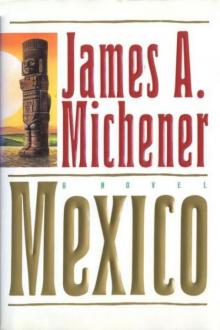 Mexico
Mexico The World Is My Home: A Memoir
The World Is My Home: A Memoir Sayonara
Sayonara Chesapeake
Chesapeake The Novel
The Novel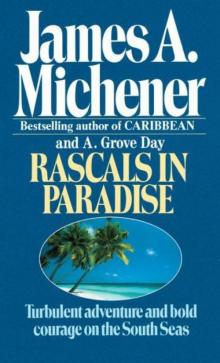 Rascals in Paradise
Rascals in Paradise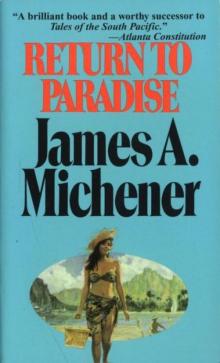 Return to Paradise
Return to Paradise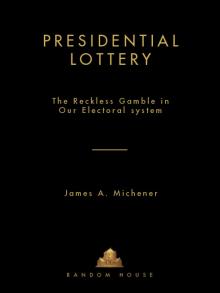 Presidential Lottery: The Reckless Gamble in Our Electoral System
Presidential Lottery: The Reckless Gamble in Our Electoral System The Source
The Source Poland
Poland Space
Space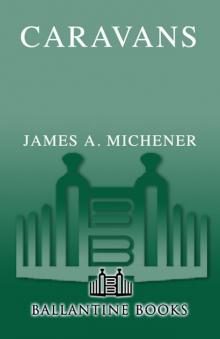 Caravans
Caravans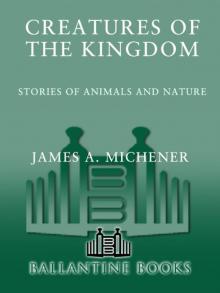 Creatures of the Kingdom: Stories of Animals and Nature
Creatures of the Kingdom: Stories of Animals and Nature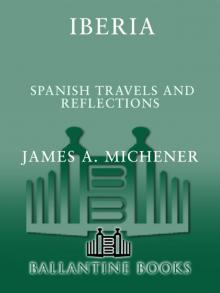 Iberia
Iberia Hawaii
Hawaii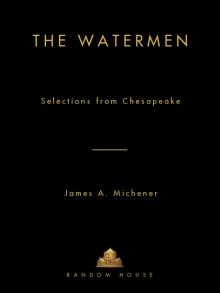 The Watermen: Selections From Chesapeake
The Watermen: Selections From Chesapeake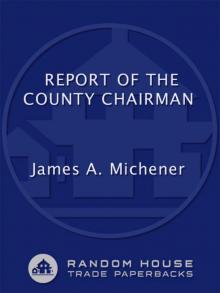 Report of the County Chairman
Report of the County Chairman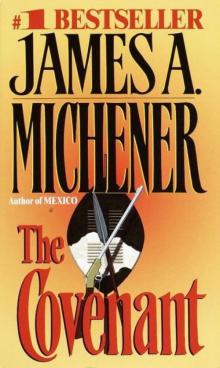 The Covenant
The Covenant The Bridges at Toko-ri
The Bridges at Toko-ri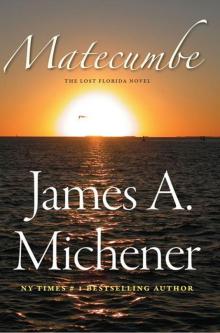 Matecumbe
Matecumbe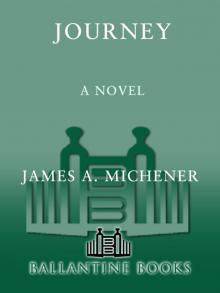 Journey: A Novel
Journey: A Novel Centennial
Centennial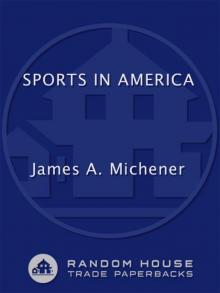 Sports in America
Sports in America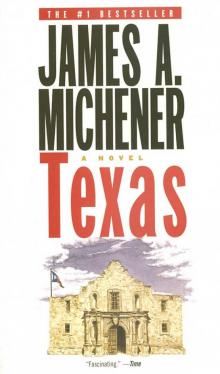 Texas
Texas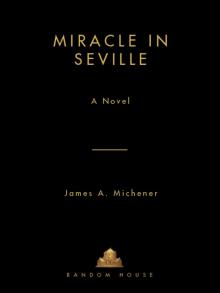 Miracle in Seville
Miracle in Seville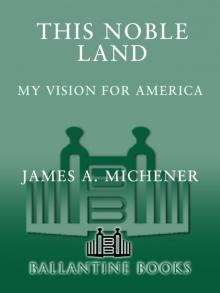 This Noble Land: My Vision for America
This Noble Land: My Vision for America Tales of the South Pacific
Tales of the South Pacific Bridges at Toko-Ri
Bridges at Toko-Ri Space: A Novel
Space: A Novel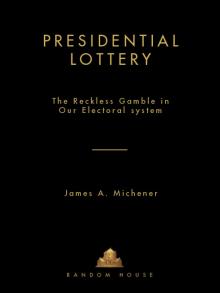 Presidential Lottery
Presidential Lottery Sayonara: A Novel
Sayonara: A Novel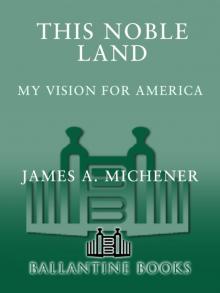 This Noble Land
This Noble Land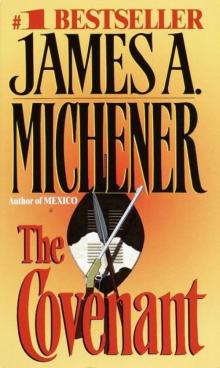 The Covenant: A Novel
The Covenant: A Novel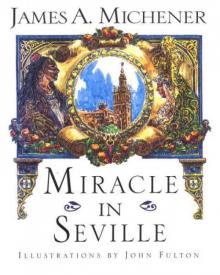 Miracle in Seville: A Novel
Miracle in Seville: A Novel The Bridge at Andau
The Bridge at Andau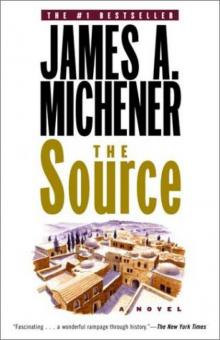 Source
Source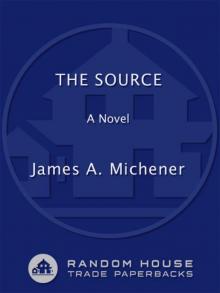 The Source: A Novel
The Source: A Novel Journey
Journey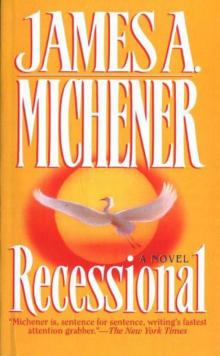 Recessional: A Novel
Recessional: A Novel Legacy: A Novel
Legacy: A Novel The Bridges at Toko-Ri: A Novel
The Bridges at Toko-Ri: A Novel Poland: A Novel
Poland: A Novel